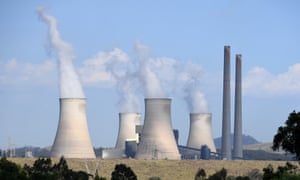The Coalition had earlier backed a failed One Nation motion supporting the coal industry
Malcolm Turnbull has refused to answer questions about whether the Coalition
will facilitate the construction of new coal power stations or retrofit
old ones as part of building internal support for the national energy
guarantee, and courting One Nation support in the Senate.
The questions on Thursday followed the government’s decision on Wednesday to vote with One Nation in the Senate backing a motion calling on the Coalition “to facilitate the building of new coal-fired power stations and the retrofitting of existing base-load power stations”.
The Hanson motion was defeated 34-32, but the Coalition’s endorsement reflects a push within the Turnbull government to ensure that coal is given transitional assistance during the energy policy overhaul. The Nationals and some dissident Liberals want a fund for either new plants or upgrading existing ones in exchange for getting behind the Neg.
One Nation has also been pushing for ongoing support for the coal industry and the government relies on the Hanson bloc of votes in the Senate.
While proponents are framing ongoing support for coal as the price of internal peace within the Coalition, Labor has warned the government that new subsidies for coal as part of any Coalition settlement on the Neg will scuttle the chances of ending 10 years of partisan warring over climate and energy policy.
The shadow climate minister, Mark Butler, has declared Labor will not
support a coal “fantasy” that flies in the face of expert advice.
Turnbull was asked by Labor in question time whether in the light of Wednesday’s Senate vote, he could advise how much taxpayers money would be allocated to build new coal-fired power stations or retrofit existing ones.
The prime minister didn’t answer the question. He said the Neg was “technology agnostic and facilitates investment in all forms of generation”.
Turnbull said the government’s focus was on lowering electricity prices. “We are turning the corner on energy prices. Across the national electricity market they are coming down from July 1, and wholesale customers have been receiving the benefit of much lower wholesale prices and lower gas prices for some time.”
“Our plan is working. We are bringing energy prices down”.
The Neg would impose reliability and emissions reduction obligations on energy retailers from 2020. The energy minister, Josh Frydenberg, will meet his state and territory counterparts in early August in an attempt to secure their agreement for the policy.
Any one of the states or territories can scuttle the Neg, because adopting it requires consensus across all the participants in the national energy market.
Before the make-or-break August meeting, the Labor states and the ACT have signalled concern that the emissions reduction target is too low to see Australia comply with its obligations under the Paris agreement.
The ACT and Victoria have also indicated concern about ongoing support for coal as part of any transition.
If Frydenberg can ultimately secure the support of the states, and then steer the required legislation back through the Coalition party room he will need Labor’s support to get the proposal through the parliament.
The questions on Thursday followed the government’s decision on Wednesday to vote with One Nation in the Senate backing a motion calling on the Coalition “to facilitate the building of new coal-fired power stations and the retrofitting of existing base-load power stations”.
The Hanson motion was defeated 34-32, but the Coalition’s endorsement reflects a push within the Turnbull government to ensure that coal is given transitional assistance during the energy policy overhaul. The Nationals and some dissident Liberals want a fund for either new plants or upgrading existing ones in exchange for getting behind the Neg.
One Nation has also been pushing for ongoing support for the coal industry and the government relies on the Hanson bloc of votes in the Senate.
While proponents are framing ongoing support for coal as the price of internal peace within the Coalition, Labor has warned the government that new subsidies for coal as part of any Coalition settlement on the Neg will scuttle the chances of ending 10 years of partisan warring over climate and energy policy.
Turnbull was asked by Labor in question time whether in the light of Wednesday’s Senate vote, he could advise how much taxpayers money would be allocated to build new coal-fired power stations or retrofit existing ones.
The prime minister didn’t answer the question. He said the Neg was “technology agnostic and facilitates investment in all forms of generation”.
Turnbull said the government’s focus was on lowering electricity prices. “We are turning the corner on energy prices. Across the national electricity market they are coming down from July 1, and wholesale customers have been receiving the benefit of much lower wholesale prices and lower gas prices for some time.”
“Our plan is working. We are bringing energy prices down”.
The Neg would impose reliability and emissions reduction obligations on energy retailers from 2020. The energy minister, Josh Frydenberg, will meet his state and territory counterparts in early August in an attempt to secure their agreement for the policy.
Any one of the states or territories can scuttle the Neg, because adopting it requires consensus across all the participants in the national energy market.
Before the make-or-break August meeting, the Labor states and the ACT have signalled concern that the emissions reduction target is too low to see Australia comply with its obligations under the Paris agreement.
The ACT and Victoria have also indicated concern about ongoing support for coal as part of any transition.
If Frydenberg can ultimately secure the support of the states, and then steer the required legislation back through the Coalition party room he will need Labor’s support to get the proposal through the parliament.

No comments:
Post a Comment